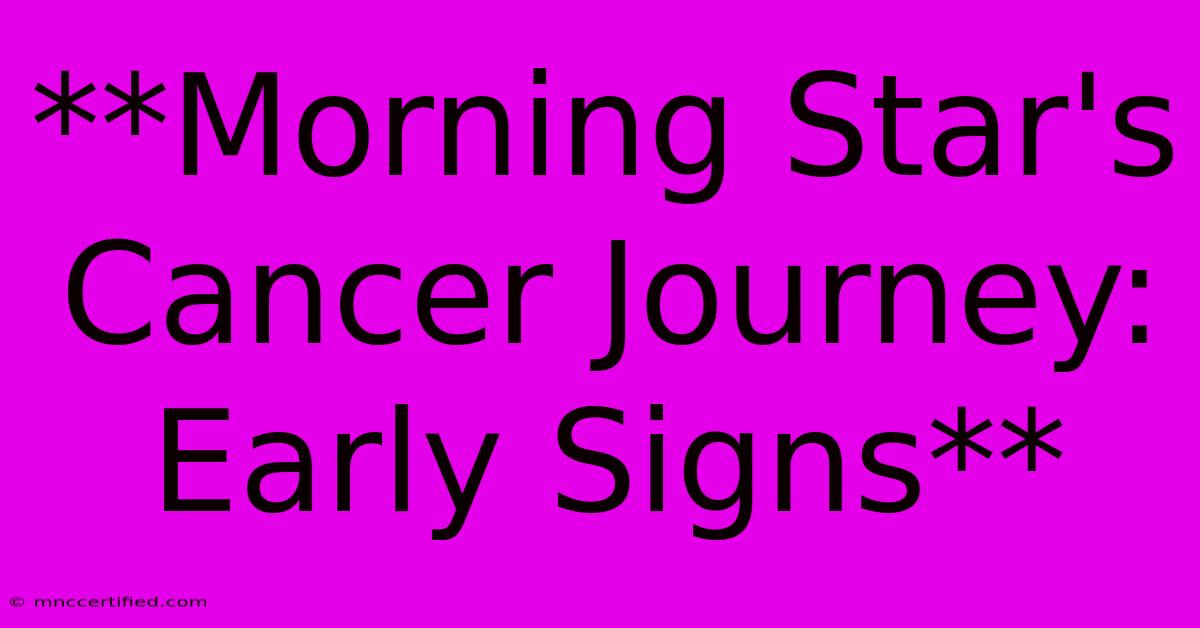**Morning Star's Cancer Journey: Early Signs**

Table of Contents
Morning Star's Cancer Journey: Early Signs to Watch For
Cancer is a complex and often frightening disease, but early detection can dramatically improve treatment outcomes and survival rates. Morning Star, a vibrant 35-year-old woman, recently embarked on a challenging journey with cancer. Her story serves as a stark reminder of the importance of understanding and recognizing potential early signs of the disease.
While Morning Star's specific cancer type is not publicly disclosed, it's crucial to remember that early detection is key across all forms of cancer. By being aware of common warning signs, individuals can empower themselves to seek medical attention promptly.
Understanding the Importance of Early Detection
Early detection is crucial for several reasons:
- Increased Treatment Success: When cancer is caught early, it is often more localized and less aggressive. This translates to more effective treatment options with higher chances of a full recovery.
- Reduced Treatment Intensity: Earlier detection frequently allows for less invasive and aggressive treatment methods, leading to fewer side effects and improved quality of life.
- Improved Survival Rates: The survival rate for many cancers is significantly higher when diagnosed at an early stage. This is due to the ability to treat the disease before it spreads and becomes more difficult to control.
Morning Star's Journey: A Wake-up Call
Morning Star's journey began with a persistent, nagging cough. While initially dismissing it as a common cold, the cough worsened and persisted for weeks, eventually becoming accompanied by a slight weight loss and fatigue. These seemingly insignificant symptoms were early warning signs that, unfortunately, went unnoticed.
This highlights the importance of not ignoring any unusual changes in your body, even if they seem minor. Early detection is critical, and it often comes down to paying attention to subtle changes that may signal a larger issue.
Common Early Signs of Cancer: Be Aware
It's important to note that not every instance of these symptoms signifies cancer. However, if you experience any of the following, it's crucial to consult a medical professional for proper diagnosis and treatment:
- Unexplained weight loss: Sudden and significant weight loss without any dietary changes could be an early sign of cancer.
- Fatigue: Persistent fatigue, even after adequate sleep, may indicate an underlying medical condition, including cancer.
- Changes in bowel habits: Persistent constipation, diarrhea, or a change in stool consistency could signal colon cancer.
- Changes in bladder habits: Frequent urination, difficulty urinating, or blood in the urine may be signs of bladder or prostate cancer.
- Persistent cough or hoarseness: A cough that doesn't go away or a change in your voice could be related to lung or throat cancer.
- Unusual bleeding or discharge: Blood in the stool, urine, or vaginal discharge can indicate various types of cancer.
- Lumps or bumps: Any new lumps or bumps, especially in the breast, neck, or groin, should be examined by a doctor.
- Changes in skin: New moles, changes in existing moles, or sores that don't heal can indicate skin cancer.
- Persistent pain or discomfort: Unexplained pain in specific areas of the body could be a sign of cancer.
Taking Action: Early Detection is in Your Hands
While Morning Star's journey serves as a poignant reminder of the importance of early detection, it also offers a message of hope. The earlier cancer is diagnosed, the more effective treatment options become available.
Be proactive:
- Schedule regular check-ups with your doctor: Early cancer screenings can detect the disease before symptoms even arise.
- Pay attention to your body: Be aware of any unusual changes in your health and don't hesitate to consult a doctor if you have concerns.
- Know your family history: If there is a history of cancer in your family, you may be at increased risk and should discuss this with your doctor.
By staying informed and taking proactive steps towards your health, you can increase your chances of catching cancer early, maximizing your chances of a successful recovery.

Thank you for visiting our website wich cover about **Morning Star's Cancer Journey: Early Signs**. We hope the information provided has been useful to you. Feel free to contact us if you have any questions or need further assistance. See you next time and dont miss to bookmark.
Featured Posts
-
Trump Investigation Expected To Conclude Soon
Nov 07, 2024
-
Market Rally Dow S And P 500 Open At Record Highs
Nov 07, 2024
-
Project 2025 Trumps Distance Explained
Nov 07, 2024
-
Biden Reacts To Trumps Election Victory
Nov 07, 2024
-
England Tour Of West Indies 3rd Odi
Nov 07, 2024